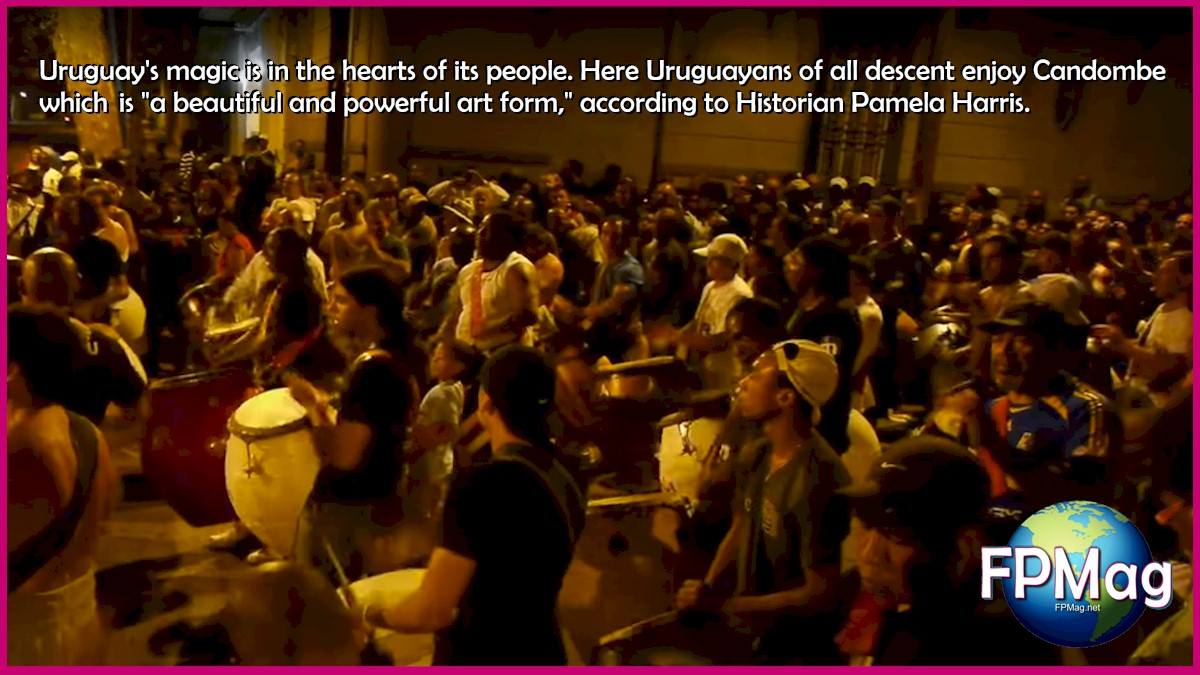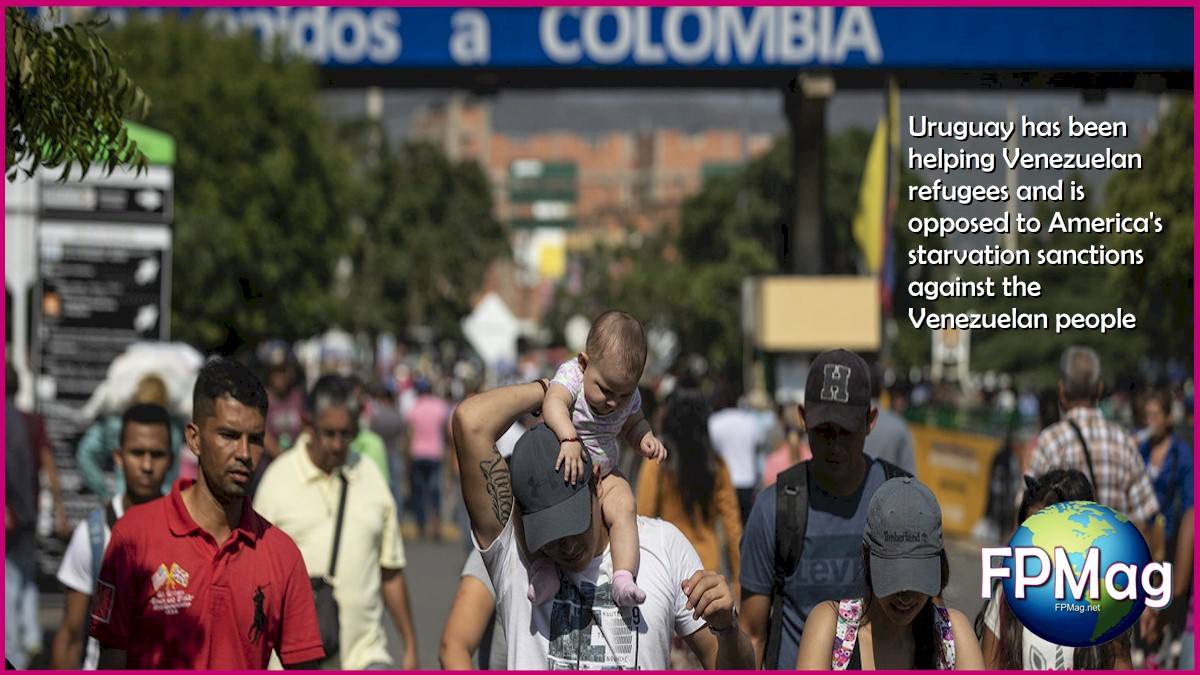The Oriental Republic of Uruguay has the least ethnic disparity issues of almost any nation but also notable in today’s global news climate, Uruguay has COVID-19 under control. It reports today that there are less than 1000 cases but, sadly 29 deaths at this time. The country has administered a little less than 80,000 RT-PCR tests.
Currently there are 73 active COID-19 cases among the people in Uruguay. The UN estimates the 1 July 2020, population at 3,473,730.
All of those 73 remaining infected persons are quarantined having tested positive for the disease but according to the Ministry of Health none of them are in intensive care and none in intermediate care.
by Sharon Santiago
Three things stand out about Uruguay in this context. “A vibrant participatory democracy, low inequality and expansive social policies, attributes that help explain Uruguay’s relative success” in the current COVID-19 pandemic, according to Jennifer Pribble, Associate Professor of Political Science and Global Studies, University of Richmond BC Canada.
Black Lives Matter. Unlike America, Blacks are not the hardest hit by COVID-19, as everyone in Uruguay has good healthcare.
Uruguay is a small country of about 3.5 million persons and while some of the South American misconducts like homicide have raised its ugliness in recent years, it is a very peaceful nation with a high standard of living and a middle class that comprises about 60% of its population of which only 10% is Black as compared to America which has a roughly 12% Black population. Race, religion and color are things Uruguayans pay little attention.
 Uruguay’s magic is in the hearts of its people. Here Uruguayans of all descent enjoy Candombe which is “a beautiful and powerful art form,” according to Historian Pamela Harris. Video Capture from: Afro Uruguay: Forward Together
Uruguay’s magic is in the hearts of its people. Here Uruguayans of all descent enjoy Candombe which is “a beautiful and powerful art form,” according to Historian Pamela Harris. Video Capture from: Afro Uruguay: Forward Together
But the Afro-Uruguayan population has made some welcome and substantial cultural contributions like “Candombe which is a beautiful and powerful art form and cultural tradition brought to Uruguay centuries ago by people of African descent. Today it represents the resilience and history of a people,” writes historian Pamela Harris for a video documentary.
How Uruguay fought and thus far minimized COVID-19 harm to the Uruguayan people
Both Uruguay’s Ministry of Health and Interior Ministry are encouraging the public to self-quarantine.
Uruguayans age 65 and older have a mandatory self-quarantine at this time. The general quarantine in Uruguay includes the following aspects:
- public and private employees from all industries over 65 years of age must remain in their homes;
- closed borders until further notice;
- a contingency center is operational for people who may be infected;
- a second contingency center for people who have to comply with quarantine is under construction;
- the quantity of food destined for municipal canteens doubled;
- the amount of cash transfers will double.
- Flights to Uruguay are suspended with the exception of humanitarian and repatriation flights.
- Uruguay has closed all its borders. All inbound and outbound commercial flights are suspended. Air, land and sea borders with Argentina and Brazil have been closed to foreign nationals until further notice. Passengers arriving from China, France, Germany, Iran, Italy, Japan, Singapore, South Korea or Spain and will be subject to a 14-day quarantine. Citizens and residents may only enter through Artigas, Bella Union, Salto, Paysandu, Fray Bentos, Mercedes, Colonia, Carmelo, Nueva Palmira, Duranzo, Melilla, Maldonado, Piriapolis, Chuy, Rio Branco, Melo-Acegua, Rivera, Puerto de Montevideo, Puerto la Paloma, Control Unico.
- Uruguayan nationals and visitors are prohibited from leaving the country for tourism.
- The use of masks is mandatory in supermarkets and warehouses.
- The government has called for the restriction of social gatherings and large crowds.
(For more details read: URUGUAY-COVID19-response Fiche)
 Uruguay has been helping Venezuelan refugees and is opposed to America’s starvation sanctions against the Venezuelan people. Photo Credit: United Nations. Photo Art/Cropping/Enhancement: Rosa Yamamoto / Feminine-Perspective Magazine
Uruguay has been helping Venezuelan refugees and is opposed to America’s starvation sanctions against the Venezuelan people. Photo Credit: United Nations. Photo Art/Cropping/Enhancement: Rosa Yamamoto / Feminine-Perspective Magazine
Uruguay has been helping Venezuelan refugees and is opposed to America’s starvation sanctions against the Venezuelan people.
Nurse Michele Francis running free medical clinics in Venezuela on behalf of RINJ, a global Civil Society women’s group, says she misses her visits to Montevideo.
“My Portuguese is not up to snuff but the medical supplies donors I meet in Montevideo are all English speaking,” says the humanitarian.
“Uruguay is an objector to the very nasty and oppressive sanctions against the people of Venezuela by the Lima Group and the USA, in fact the people of Uruguay vacated the RIO Treaty for a few months before they realized they had lost a seat at the table and rejoined recently, which is what we suggested,” recalled nurse Michele.
“Several groups in Uruguay have worked with workers in Canada to help collect clothing and blankets for the millions of Venezuelan refugees, and we have three nurses either from Uruguay or related to people in Uruguay who have come to volunteer in our clinics and small hospital. Their families in Uruguay wholeheartedly support their work and I make an effort to call on the families when I visit Montevideo. Uruguay is a bastion of wholesomeness and humanitarianism,” she added.
Long History of solid high-standards health care.
One of the bio-medical labs in Montevideo, Uruguay the Microbial Genomics Laboratory, Institut Pasteur Montevideo, has made multiple contributions of COVID-19 strains to the global genomics database and has played a role in fighting COVID-19 in Uruguay.
A Spanish Hospital, Asociación Española, was first opened in Montevideo, Uruguay’s capital, in 1853. A British Hospital, originally called Hospital Extranjero opened in Montevideo in 1857. They are large active medical hubs for patient care, medical academic learning and teaching, today.
Uruguay’s elite health plans have alternatives, including private health insurance through global groups such as BlueCross.
Uruguay also has an affordable private hospital membership plan called a mutualista is available for those with smaller incomes or who simply want to make that choice.
Uruguay recently had a change in government and one of its Conservative Senators is now the President. He is a surfer.
Since 1985 Uruguay has been a “democratic constitutional republic, with a president who serves as both head of state and head of government,” according to Own Blacker, Wikipedia author..
 Former Senator of Uruguay, Luis Lacalle Pou is the 42nd President of Uruguay.
Former Senator of Uruguay, Luis Lacalle Pou is the 42nd President of Uruguay.
Presidential Photo Credit: Alan Santos.
Photo Art/Cropping/Enhancement: Rosa Yamamoto / Feminine-Perspective Magazine
Luis Lacalle Pou is the 42nd President of Uruguay. A former Senator, he is 46 years old (11 August 1973), married since 2000 and has three children. He is a surfer since 12.
 The Uruguayan President is a surfer. A conservative, and a former senator. Photo Credit: BeachGrit Magazine Photo Art/Cropping/Enhancement: Rosa Yamamoto/ Feminine-Perspective Magazine
The Uruguayan President is a surfer. A conservative, and a former senator. Photo Credit: BeachGrit Magazine Photo Art/Cropping/Enhancement: Rosa Yamamoto/ Feminine-Perspective Magazine